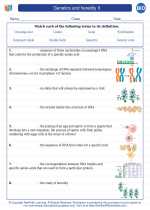Genomics
Genomics is the study of an organism's entire genome, including the organization, function, and evolution of its genes. It involves the comprehensive analysis of DNA sequences and their interactions within the genome.
Key Concepts in Genomics
- Genome: The complete set of genetic material present in an organism.
- DNA Sequencing: The process of determining the precise order of nucleotides within a DNA molecule.
- Gene Expression: The process by which information from a gene is used to synthesize a functional gene product, such as a protein.
- Comparative Genomics: The study of the similarities and differences in the genomes of different species.
- Functional Genomics: The study of gene functions and interactions on a genome-wide scale.
- Structural Genomics: The study of the structure of genomes, including the mapping of genes and DNA sequences.
Importance of Genomics
Genomics plays a crucial role in various fields, including medicine, agriculture, evolutionary biology, and biotechnology. It has led to advancements in personalized medicine, genetically modified crops, and our understanding of the genetic basis of diseases.
Study Guide
- Understand the structure and function of DNA and RNA.
- Learn about the techniques and technologies used in DNA sequencing, such as Sanger sequencing and next-generation sequencing.
- Explore the principles of gene expression and regulation.
- Study the methods of comparative genomics and their applications in evolutionary studies.
- Understand the concept of genetic variation and its significance in genomics.
- Explore the ethical, legal, and social implications of genomic research and technologies.
[Genomics] Related Worksheets and Study Guides:
.◂Biology Worksheets and Study Guides High School. Genetics and heredity II
Worksheet/Answer key Genetics and heredity II
Genetics and heredity II  Worksheet/Answer key
Worksheet/Answer key Genetics and heredity II
Genetics and heredity II  Worksheet/Answer key
Worksheet/Answer key Genetics and heredity II
Genetics and heredity II  Vocabulary/Answer key
Vocabulary/Answer key Genetics and heredity II
Genetics and heredity II  Vocabulary/Answer key
Vocabulary/Answer key Genetics and heredity II
Genetics and heredity II  Vocabulary/Answer key
Vocabulary/Answer key Genetics and heredity II
Genetics and heredity II  Vocabulary/Answer key
Vocabulary/Answer key Genetics and heredity II
Genetics and heredity II  Vocabulary/Answer key
Vocabulary/Answer key Genetics and heredity II
Genetics and heredity II  Vocabulary/Answer key
Vocabulary/Answer key Genetics and heredity II
Genetics and heredity II  Vocabulary/Answer key
Vocabulary/Answer key Genetics and heredity II
Genetics and heredity II 

 Worksheet/Answer key
Worksheet/Answer key
 Worksheet/Answer key
Worksheet/Answer key
 Vocabulary/Answer key
Vocabulary/Answer key
 Vocabulary/Answer key
Vocabulary/Answer key
 Vocabulary/Answer key
Vocabulary/Answer key
 Vocabulary/Answer key
Vocabulary/Answer key
 Vocabulary/Answer key
Vocabulary/Answer key
 Vocabulary/Answer key
Vocabulary/Answer key
 Vocabulary/Answer key
Vocabulary/Answer key

The resources above cover the following skills:
LIFE SCIENCE (NGSS)
Heredity: Inheritance and Variation of Traits
Students who demonstrate understanding can:
Ask questions to clarify relationships about the role of DNA and chromosomes in coding the instructions for characteristic traits passed from parents to offspring.